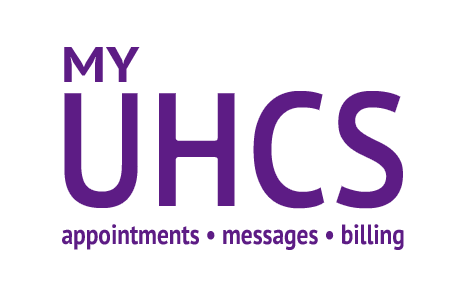Weight - What's Best for You?
Wellness Information
UHCS Services
Here at UHCS we meet with students who have questions about gaining weight, losing weight or maintaining a healthy weight. Our staff members can give you advice on diet and nutrition, exercise and other weight management strategies.
Overview
Determining what your ‘healthy weight’ is can be really difficult. Unfortunately, we live in a society where we are bombarded by images telling us what is ‘ideal’. We are all built differentlty. It is important for all people to find their healthy weight because being overweight or underweight is associated with a range of negative health outcomes.
Tips to Determine Your Best Weight
- Determine your current body mass index (BMI). BMI is a tool that takes into account your height and weight to measure your current weight status. There are numerous BMI calculators online. I like to use NHLBI BMI calculator.
- If your BMI is less than 18.5, you are in the underweight category. Talk to your doctor to find out if your weight is a symptom of a medical problem.
- If your BMI is between 19 and 24.9, you are in the recommended weight range for your height. But your health may still be at risk if you are not getting regular physical activity and practicing healthy eating.
- If your BMI is 25 to 29.9, you are in the overweight category. This may or may not be unhealthy, depending on some other things, like your waist size and other health problems you may have.
- If your BMI is 30 or higher, you’re in the obese category. You may need to lose weight and change your eating and activity habits to get healthy and stay healthy.
***Remember that BMI does not take into account muscle mass. If you are incredibly muscular, your BMI may be in a higher category and not accurately depict your weight status.
- Set a goal weight. To do this you can look at the healthy weight range based on your BMI. Cool trick: using your middle finger and thumb on one hand, make a circle around the other wrist. If your fingers overlap, you have a small frame. Fingers touching equals a medium frame and if your fingers are not able to touch, you have a larger frame. Based on these small/medium/large categories, you can get an idea of whether or not your weight should be at the lower or higher end of your healthy weight range.
- Regardless of if you are trying to gain weight, lose weight or just stay the same, be sure you eat lots of fruits, vegetables, whole grains, lean meats/protein and low-fat dairy. Try to avoid fast-food, sweets, processed food and soda. Eat breakfast. Exercise.
If you are trying to lose weight, 1-2 pounds of weight loss per week is great. If you are losing more than that, the change is less likely to stick over the long term. - Set goals for yourself and track your progress.
- Come talk to us if you need more ideas or support.
Resources
Disclaimer
All information on this website is written by UHCS professional staff unless otherwise noted. No data is collected on visitors to this site. Financial Support for this web site is provided by University Health & Counseling Service, Division of Student Affairs, University of Wisconsin-Whitewater. This web site does not accept advertising.
This site is not meant to replace the advice of a health care or counseling professional. You should not rely on any information on these pages, or information generated for you by this site, to replace consultations with qualified professionals regarding your own specific situation. Some links take you to a source outside of UHCS. The owners of that site, not UHCS, are responsible for the content.



